Sailing Superstitions
As far as we can look back in history, sailing and maritime superstitions on boats and ships have always been prevalent. Why? Being a mariner was, and still is, an extremely dangerous job.
To mitigate against one’s own demise and those around you, it was a common belief that these superstitions guarded the mariners against evil spirits or conversely invited kind spirits to look over them.
Several publications are delving into this with some depth, but here we try to list some of the main sailing and maritime superstitions that are still around today…
Before I start, I have to say that I do not believe in superstition. This is not to say I ignore anything to do with superstition. For example, I don’t walk under ladders, but only because things may fall from them and injure me.
The dictionary defines superstition as:
A widely held but irrational belief in supernatural influences, especially as leading to good or bad luck, or a practice based on such a belief.
This is my theory about superstition…
I think that as a human race, we develop quickly because we have an uncanny ability to learn from our experiences and then pass these learnings on to the next generation. We look at something and identify what caused things to happen (cause and effect), then lock this information away in our brain and apply it where the need arises. So we learned that if you tell a giant, mean-looking bouncer at a nightclub that you slept with his mother, your nose will start to bleed soon after. We have done this three times, and we have established a reasonably sound cause and effect. Over time, people start correlating a bleeding nose with bouncers, but we all know that correlation does not imply causation. But before we know it, bouncers are bad luck as they cause nose bleeds and perhaps other misfortunes, whereas in reality, the original clubber was just stupid.
Renaming your boat
Renaming your boat is bad luck because you are stuffing up Poseidon’s ledger. If you must rename your boat, then be sure to read this article first, as it will prevent your boat from sinking and your crew from dying…
Renaming your boat – the correct process
Red sunrise/sunset
 “Red sky at night, sailor’s delight. Red sky in morning, sailor take warning.”
“Red sky at night, sailor’s delight. Red sky in morning, sailor take warning.”
We have all seen this before. The inherent meaning is clear. A red sky at night is a good thing whereas a red sky in the morning is bad.
Is this purely a superstition, or is there more to it? The etymology of the saying goes back a long time. This does not necessarily mean that it is true, but there is some logic that will ack it up.
Let’s have a look at some of the early usage of the phrase starting with the Bible:
“When it is evening, ye say, It will be fair weather: for the sky is red. And in the morning, It will be foul weather today: for the sky is red and lowering. O ye hypocrites, ye can discern the face of the sky; but can ye not discern the signs of the times?” —Matthew xvi: 2, 3
Venus and Adonis by William Shakespeare also refers to the red morning sky as a “wreck to the seaman”:
“…Once more the ruby-colour’d portal open’d,
Which to his speech did honey passage yield;
Like a red morn, that ever yet betoken’d
Wreck to the seaman, tempest to the field,
Sorrow to shepherds, woe unto the birds,
Gusts and foul flaws to herdmen and to herds…”
Science or superstition?
It turns out that “Red sky at night, sailor’s delight. Red sky in morning, sailor take warning” has some validity within the scientific community.
Let’s state some facts:
- We know the sun rises in the East and sets in the West
- The red colours you see in the sky are the direct result of sunlight bouncing off suspended dust bits and other impurities in the sky.
- Dust particles are predominantly found in the lower part of the atmosphere and driven down by high pressure.
- Generally speaking, weather systems travel in a westerly direction.
Knowing these facts, we can surmise that if we can see a high-pressure (red) cloud front to the East (sunrise), it is likely to move towards us: “Sailor, take warning”. Conversely, if we see a high-pressure (red) cloud front to the West (sunset), it is likely to move away from us: “Sailor’s delight”.
Mackerel scales and mare’s tails make lofty ships carry low sails.

Another weather-related “superstition”, or perhaps a better term “proverb”, is:
“Mackerel scales and mare’s tails make lofty ships carry low sails.”
The “mare’s tails” clouds are feathery cirrus clouds. On the other hand, “mackerel scales” clouds are small, unwieldy altocumulus clouds that, in some cases, look a bit like fish scales.

Both these types of clouds are often the vanguard of a warm-weather front. As we know, warm fronts can bring unpredictable gusty winds and squalls as well as lots of rain.
So again, these types of superstitions can perhaps be better classified as proverbs because they are based on some factual information that has proven to be true in many instances and is backed up by some good old-fashioned science…
Women on boats

It needs no mention that women are great sailors. None more so than Tracy Edwards and her 1990 Whitbread Round the World Race crew, arguably the vanguard of women sailors.
But this was not always the belief among mariners. Women were not allowed on naval vessels at all and only begrudgingly on commercial vessels.
Why? Well, perhaps it says more about the sailors than the women, but it was decided early on that women distracted sailors, hence reducing productivity and perhaps causing accidents on board. At some point in time, this was translated to mean “bad luck”, whereas today, we would call it bad Human Resource Management. Further back in time, it was believed that women onboard ships would anger the gods, and this anger would lead to ominous weather and angry seas.
The Vikings had no issues at all with women on ships so the superstition is rather localised.
Figureheads
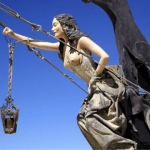
To make sure that men and not women themselves created this superstition, we can look at the other side of the coin, where naked women were considered good luck. I guess this is like saying that money in your wallet is good luck, but we digress…
We can see evidence of this when we look at ship’s figureheads that often displayed an ornately carved sculpture of a female or mermaid with one or two breasts exposed.
It was believed that naked women calm the seas and take the edge off bad weather…
There is also evidence that there was some acknowledgement that women were somehow good at navigating through the dark night but, as previously determined, had to be half-naked to do so…
Bananas are a no-no
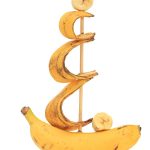 This is arguably the most prevalently used superstition that mariners and landlubbers know about. Bananas are bad luck on boats.
This is arguably the most prevalently used superstition that mariners and landlubbers know about. Bananas are bad luck on boats.
Like most superstitions, the etymology goes back for many years, and often, there are some compelling arguments to suggest that there are some true facts associated with the superstition. Let us have a look and see if we can convince ourselves, or at least understand why, the superstition came about.
There are many theories, and most seem plausible, particularly when fiction is supplemented with some indisputable facts (ask the author Dan Brown):
1. Ethylene gas
Bananas produce ethylene gas (C2H4), which acts as a plant hormone. Plants have genes called ETR1 and CTR1 that regulate lots of other genes involved with growth, ageing, and cell death.
- Assumption: In the early days of merchant shipping, bananas were a valuable cargo, but carrying bananas caused other fruit-based cargo to ripen prematurely and go off, presumably caused by the ethylene gas produced. This would cut severely into the bottom line or even remove all food sources for sailors on long journeys. I.e., bad luck.
2. Crawling nasties
- Fact: Tarantulas comprise a group of large and often hairy spiders of the family Theraphosidae, and, when bitten by one, cause severe pain.
- Assumption: Tarantulas can and will hide in bunches of bananas. As a sailor, dealing with a spider the size of your hand is bad enough. Ships have confined spaces and lots of nooks and crannies, so these monsters could stay on board indefinitely, multiply, and “kill” all of the crew. A similar theory can be argued for snakes, and other tropical nasties sailors were not used to. I.e., bad luck…
3. Can’t fish – can’t eat
- Fact: Mariners often trawl for fresh fish with lures during long journeys to supplement their meagre rations.
- Assumption: As Bananas ripened quickly, merchants often used the fastest ships they had to carry bananas. The ship’s speed would be too fast for trawling, so sailors found themselves without fresh fish. I.e., bad luck…
I experienced prejudice against bananas myself when I went on a small fishing boat I shared with the skipper and a lady in her eighties. The fishing was going “not to plan”, and we needed to pick up anchor and move several times to potentially “greener pastures”. Every time we moved, the skipper would take out his phone and show us pictures of all the fish they caught “yesterday”. Mmmm… Lunchtime came, and we sat down to eat our packed lunches. The old lady opened her lunchbox only to reveal she had a banana in there. After the skipper noticed the fruit, he became noticeably and inappropriately angry at the poor old duck, so I had to intervene and calm him down. He then went to the back of the small pontoon-like boat and performed a little ritual that, as of today, still perplexes me. We didn’t catch anything that day, but the effect does not prove causation – or does it? So bad luck and bananas may not be real to most, but it is definitely very real to some.
Whistling into the wind
 It is not hard to believe that the wind played a big part in the lives of sailors before steam engines. No wind made it impossible to manoeuvre the ship in and out of harbours or reach its destination. Too much wind was even worse as this may lead to the ship’s demise.
It is not hard to believe that the wind played a big part in the lives of sailors before steam engines. No wind made it impossible to manoeuvre the ship in and out of harbours or reach its destination. Too much wind was even worse as this may lead to the ship’s demise.
So, from day one, the wind was a source of superstition among mariners from all over the globe. From the Japanese Fūjin, the wind god and Susanoo, the god of storms, to the Viking’s Njord, god of the wind. Almost all cultures have one or more deities that control the wind…
Other cultures may have been influenced by Greek mythology and based their wind gods on Boreas the North-Wind, Zephryos the West-Wind, Notos the South-Wind, and Euros the East-Wind.
In any case, sailors, being a superstitious bunch, have always endeavoured to please the wind gods irrespective of entity name or origin, perhaps simply under the belief of “better safe than sorry”.
So, whistling into the wind… Why is whistling into the wind on a boat bad luck? There is no clear evidence of where this originated from, but based on the above, we can assume that blowing or whistling into the wind may upset the respective wind gods. A sign of disrespect, perhaps…
There is, of course, the expression “whistling for a wind”, which is all about encouraging the wind to come to the ship. As long as it was not done against the wind, the belief was (is) that this would bring favourable winds and help the sailors reach their destination in good time.
Whistling causing bad luck is not confined to mariners exclusively. In the UK, the belief was that seven birds flying overhead and “whistling” also caused bad luck. Sailors shared this superstition with others in dangerous occupations and miners in particular. Hearing the seven birds meant that dead sailors warned the living of imminent and ominous danger.
Other cultures equally associate whistling with bad luck, such as the Russian saying “whistling away money,” which is loosely based on the idea that whistling brings bad (financial) luck. Whereas in Türkiye, whistling summons the devil.
So, there is no doubt that whistling is perceived to be bad luck on boats. Don’t do it. If not for your sake, do it for the skipper…
Tattoos
There are many reasons why tattoos were (and still are) popular with sailors. In most cases, a tattoo will signify an accomplishment, such as a blue swallow signifying that the sailor achieved 5,000nm. Also, the dragon signifies that the sailor travelled to China, and the turtle signifies that the sailor crossed the equator. In short, these were simply badges of honour…
Tattoos were also popular because of who you were and what your job was. For example, crossed anchors tattooed in the web of the hand signified that you were employed as a Boatswain, whereas a harpoon signified you were a whaler…
However, here we will list some of the tattoos that are more based on superstition and myth. Although some of the etymology and history of these superstitions are rather vague, one can still see the reasoning as to why sailors may have adopted them.
Pigs and Roosters

It is important to note that most sailors in the age of sail could not swim. So it stands to reason that superstition played a big part in the lives of sailors, and they, therefore, did anything possible to bring good luck on their side. The rooster and pig bring good luck based on 2 explanations that both carry similar weight.
- Neither pigs nor roosters are great swimmers, so when a ship sunk and/or disintegrated on rock, it was believed that both pigs and roosters would take the shortest and safest route towards the shore. As a sailor, you then somehow need to follow them to safety…
- The second potential reason may be that pigs and roosters often survived a shipwreck and were washed ashore. This is because they were transported in wooden crates that floated. Clinging to such a crate could save your life…
The North Star
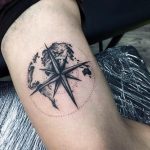
Since the beginning of time, sailors have navigated the seas and oceans guided by celestial bodies like the sun, the moon, and the stars. One of the stars that helped sailors find their way at night was the North Star, perhaps better known as Polaris or simply the Pole Star.
So, what is special about Polaris? Well, this celestial body is in line with the Earth’s rotational axis and can be seen in the northern hemisphere above the North Pole. Because it lies on the same axis as the Earth, it can be seen in the night sky as practically stationary, where all other celestial bodies appear to move around it.
This makes it very handy for navigational purposes because it was always easy to see where north was and hence deduct the ship’s direction on the compass rose…
Twin Propellers
So here, there is a fine line between some dark humour and superstition. However, sailors of more reasoned times found it funny or perhaps necessary to have a large tattoo of a screw tattooed on each buttock, i.e., the twin propellers.
The reasoning behind this is simple. When you find yourself inadvertently in the water, you can proceed by using a relaxed backstroke to propel yourself towards the shore, assumably assisted by the twin propellers on your but. Humour or superstition? It is out there, so I mentioned it, but you decide about it… (the lack of an image is intentional)
Swallows

We already spoke about the swallow as a badge of honour (5,000nm), but there is more to the swallow than just that.
Like most of these superstitions, the etymology behind the swallow is somewhat in the air. However, there are some good arguments that could perhaps explain why the swallow was a very popular “good luck” tattoo.
- Swallows are migratory birds and travel long distances to find their home each year. Reflecting on that, we can see why the swallow was attractive in this sense.
- There was also a belief that swallows could carry your soul to heaven after you die. In this sense, the swallow tattoo will always get you home. That is, either to the wife and kids or heaven.
Crosses on the soles of your feet
 None of us likes a shark that circles us while building up the courage to have us for lunch. Sailors hated sharks as they predicted bad luck when following the ship, but more so because they didn’t want to be eaten.
None of us likes a shark that circles us while building up the courage to have us for lunch. Sailors hated sharks as they predicted bad luck when following the ship, but more so because they didn’t want to be eaten.
The solution was to tattoo a cross on the sole of each foot. This would discourage sharks from having a nibble at your expense…
All things to do with funerals
Sailors were accustomed to losing one or two of their fellow sailors on any one journey due to the dangerous nature of the job, lack of medical provisions and doctors, tropical diseases, or simply bad luck. It stands to reason that under these conditions, sailors would try almost anything to balance the odds in their favour. So, anything to do with funerals was frowned upon as it was seen as a self-fulfilling prophecy to invite disaster and death onto a ship.
Flowers on a boat – bad luck
In the mind of most sailors, flowers are for funerals and have no place on a ship. Any flowers discovered were quickly disposed of to not invoke one of the sailor’s death.
Priests and clergymen on boats – bad luck
A male priest, minister, or religious leader, especially a Christian one, was not welcome aboard ships. The general idea was that men of the cloth presided over funerals, bringing bad luck and death.
Animals
Animals and superstition dovetail (no pun intended) well for dozens of reasons. From evil spirits taking on the shape of animals to witches, animal superstition is not unique to the sailing world.
Here are a few animals that either bring good or bad luck, so do not mix them up…
Look after the black cat for good luck
Paradoxically, cats on land are often seen as bad luck.

It was commonly believed that witches used to be able to take the form of a cat. Not so in nautical terms. Cats are not necessarily good luck, but neglecting a ship’s cat will bring bad luck.
The superstition developed in WWII, where several examples of cats defied the odds. For example, “Oscar the Unsinkable”, who, as the story goes, served on both German and British naval vessels and allegedly survived the sinking of three ships…
Albatross
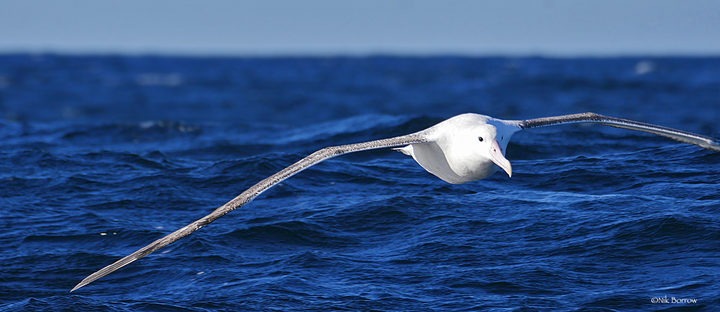
Being followed by an albatross was generally seen as a sign of good fortune. Then, in the 1834 poem “The Rime of the Ancient Mariner” by SAMUEL TAYLOR COLERIDGE, the mariner’s bad luck began after he shot the albatross:
…”God save thee, ancient Mariner!
From the fiends, that plague thee thus!—
Why look’st thou so?’—With my cross-bow
I shot the ALBATROSS”…
So, poem or no poem, killing a good luck charm can never be a good thing…
Sharks
 There is no doubt that a shark can conjure up horrific images in anyone’s mind, let alone sailors who could barely swim. Stories of man-eaters that grew in size in direct proportion to the alcohol consumed by the orator of the story and earned an extra foot in length for each year that passed were common enough.
There is no doubt that a shark can conjure up horrific images in anyone’s mind, let alone sailors who could barely swim. Stories of man-eaters that grew in size in direct proportion to the alcohol consumed by the orator of the story and earned an extra foot in length for each year that passed were common enough.
But for most sailors of the age of sail, sharks following the ship only mend one thing: imminent death…
Rabbit
As we all know, rabbits are often witches in disguise, or when you are unlucky enough, it may even be the Devil himself.
Paradoxically, a rabbit’s foot is considered good luck on land, but any part of a rabbit at sea brings unspeakable bad luck. What about felt hats?
Dolphins
 Dolphins swimming along the side of a ship (or bow-riding) is a sign of good luck. As fellow mammals, there are hundreds of stories about sailors being rescued by dolphins either by being guided to land or fending off shark attacks.
Dolphins swimming along the side of a ship (or bow-riding) is a sign of good luck. As fellow mammals, there are hundreds of stories about sailors being rescued by dolphins either by being guided to land or fending off shark attacks.
Manta Rays
 It was believed that manta rays were employed by Davie Jones and were trained to crab ship anchors and drag the ship down to his locker…
It was believed that manta rays were employed by Davie Jones and were trained to crab ship anchors and drag the ship down to his locker…
Ravens
 The raven or crow are messengers of bad luck. This stems from Greek mythology, where ravens are associated with the God of prophecy, Apollo. Conversely, the Vikings used crows and ravens to navigate and find land, which is where the idiom “as the crow flies” originates.
The raven or crow are messengers of bad luck. This stems from Greek mythology, where ravens are associated with the God of prophecy, Apollo. Conversely, the Vikings used crows and ravens to navigate and find land, which is where the idiom “as the crow flies” originates.
Swallows
 Swallows are land-based, so if you spotted a swallow after perhaps being lost at sea for some time, it meant that land was not too far away and there was still hope that you survived your ordeal.
Swallows are land-based, so if you spotted a swallow after perhaps being lost at sea for some time, it meant that land was not too far away and there was still hope that you survived your ordeal.
Furthermore, within Greek mythology, swallows were connected with Aphrodite, the goddess of Love, so sailors spotting a swallow may be anticipating both land and love as well…
Seagulls
 Seagulls were seen as the vessels in which the souls of dead sailors wandered the seven seas. It was also believed that the squawk or squeal of a gull was the desperate cry of the dead sailor to move on out of purgatory and on to heaven.
Seagulls were seen as the vessels in which the souls of dead sailors wandered the seven seas. It was also believed that the squawk or squeal of a gull was the desperate cry of the dead sailor to move on out of purgatory and on to heaven.
A common theme with animals and superstition is that the animal doesn’t necessarily bring good luck, but killing it will bring doom…
Cormorants
 The duality of cormorants in terms of superstition is probably enough reason to raise at least one eyebrow. In Scandinavian countries, this large black bird is seen in a positive sense because of the belief that birds carry the spirits of loved ones.
The duality of cormorants in terms of superstition is probably enough reason to raise at least one eyebrow. In Scandinavian countries, this large black bird is seen in a positive sense because of the belief that birds carry the spirits of loved ones.
However, these birds are generally seen as competition to fishermen because they are extremely capable of collectively catching large amounts of fish.
People
Sailor’s superstitions are not necessarily politically correct. There are lots of examples where a particular demographic is singled out for some good old-fashioned discrimination. Let’s have a look at some of these…
Redheads on boats are bad luck
 Is this because redheads may have a fiery personality or because they were just a bit different and, therefore, the target of blame?
Is this because redheads may have a fiery personality or because they were just a bit different and, therefore, the target of blame?
In any case, gingers were not welcome on ships and should be avoided. However, where there was no choice, it paid to approach the red-headed sailor and speak to him before they spoke to you. A mitigation strategy that makes sense???
People with flat feet are bad luck on boats
 Like redheads, flat-footed people were to be avoided and not welcome on ships. This went as far as avoiding flat-footers 1 week before the ship set sail. If you know how this came about then please leave a comment below…
Like redheads, flat-footed people were to be avoided and not welcome on ships. This went as far as avoiding flat-footers 1 week before the ship set sail. If you know how this came about then please leave a comment below…
No women on ships
 As discussed in more detail above, women were considered bad luck. Tell that to Poland’s Krystyna Chojnowska-Liskiewicz, who in 1978 became the first woman to sail solo around the world.
As discussed in more detail above, women were considered bad luck. Tell that to Poland’s Krystyna Chojnowska-Liskiewicz, who in 1978 became the first woman to sail solo around the world.
A child born on board a ship was good luck
 How can it be otherwise; children born on ships were seen as good luck and a sign of better days ahead.
How can it be otherwise; children born on ships were seen as good luck and a sign of better days ahead.
Children were often delivered in between the guns, which offered some privacy. However, if there were no sailor stepping forward as the father, the Captain would enter the child in his log as “a son of a gun”. It’s a cool thing to have on your birth certificate!
A Jonah
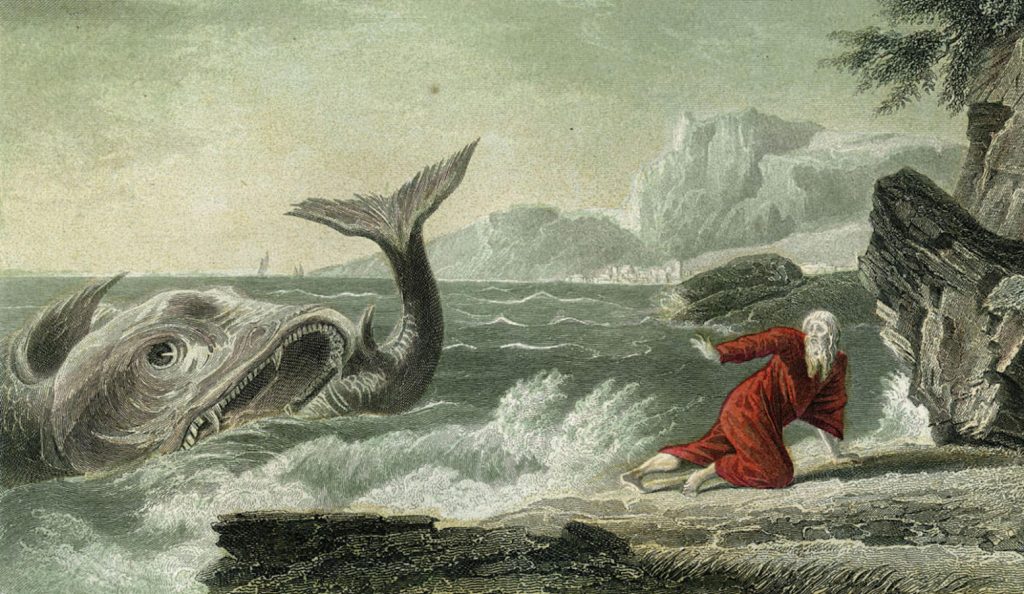
Jonah, or Jonas, is the main character in the Book of Jonah. You may recall the story about him being swallowed by a fish or whale… Before this, Jonah, the prophet, was on a mission from God to forewarn the Nineveh citizens of their city’s destruction.
However, Jonah gets distracted and boards a ship that finds itself soon after in terrible seas and atrocious storms. He is convinced that God is punishing him, and to save the crew of the ship, he demands to be thrown overboard, after which the whale comes in; he is spat out after three days; he saves the citizens of Nineveh and so on…
So now, “a Jonah” can be anyone who causes bad luck. So, there is no need for overt discrimination against specific demographics in our society, as we have seen above. It is open season, and anyone you consider can bring misfortune… This could include jet skiers!
If you have any other sailing superstitions you can think of, then please leave them in the comments below…
Days and dates
Days of the week, special days, or any other date related to maritime superstition are not uncommon. Here are a few…
Do not depart on Friday
Friday is seen as a “bad luck day” more likely than not because Jesus Christ was crucified on a Friday. Friday the 13th was seen as extremely unlucky, but there is no real correlation between the day and the date other than perhaps the arrests of the Knights Templar, which started on Friday 13 October 1307.
Sailing on a Thursday
The Germanic god Thor is the basis for naming the day of the week “Thursday”. Being the Norse God of thunder, his impressive hammer was something sailors took note of. Sailing on “Thor’s Day” was seen as pushing your luck a bit, particularly if thunder clouds were on the horizon…
The first Monday in April
I think we can see a trend here and a close connection to the Bible. The first Monday in April is seen as bad luck simply because Cain killed his brother Able. Obviously, this day is hard to avoid whilst on a long voyage, but it pays to be extra careful…
Second Monday in August
The second Monday in August is the day when Sodom and Gomorrah came to their demise. It is clear that Christianity heavily influences superstition… In any case, I’d like you to please take note of potential disasters on that day…
Miscellaneous Sailing Superstitions
Here, we are at the tail end of sailor’s superstitions with some odds and ends and some more dubious superstitions for which there are little or no references. If you can add your explanation, please leave a comment below…
The colour green is bad luck on boats
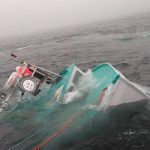 It is well known that green is associated with the land. We look at the land and see green trees and undulating green pastures. It is, therefore, only “logical” that sailors believed that green belonged onshore and had no place on a ship. This includes green hulls and decks but also green ropes and anything that was green.
It is well known that green is associated with the land. We look at the land and see green trees and undulating green pastures. It is, therefore, only “logical” that sailors believed that green belonged onshore and had no place on a ship. This includes green hulls and decks but also green ropes and anything that was green.
Why? Well, there are many theories that delve into the origin of this superstition. It is most likely a combination of these reasons that many sailors still believe that green has no place on a ship.
- It was generally believed that a green ship would naturally want to return to land because green was a land colour. So, it was feared that ships would run aground for this reason.
- Green was also associated with the colour of dead sailors and therefore avoided where possible.
- Another reason may well be that green was believed to attract mould more than other colours. So having green on board would invite mould and therefore either sickness or more cleaning work or both.
A coin under the mast
 This superstition is thousands of years old and can be found as far back as Roman times. Today, putting a coin (now often a silver dollar) under the mast is still common practice.
This superstition is thousands of years old and can be found as far back as Roman times. Today, putting a coin (now often a silver dollar) under the mast is still common practice.
Why? Well, it originates in Greek mythology where Charon the ferryman needed to be paid to get your soul across the River Styx on which shores one could find the final resting place of mankind. To pay Charon, a coin was placed in the mouth of the deceased, which he could use as payment.
Roman sailors further took up this myth with a similar required outcome. If the ship sunk, sailors would still have access to coins to use in the afterlife.
Today, it generally just symbolizes good luck…
Saying “good luck” brings bad luck
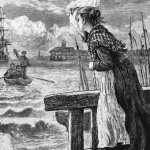 Saying good luck to a sailor when he sets off towards foreign shores is not generally done. There are several schools of thought about the origin of this superstition, and the fact that it is a popular belief today suggests it could be a combination of the following…
Saying good luck to a sailor when he sets off towards foreign shores is not generally done. There are several schools of thought about the origin of this superstition, and the fact that it is a popular belief today suggests it could be a combination of the following…
- It was believed that God determined your destiny, and luck had no part in it. Therefore, wishing someone “good luck” may be seen as almost sacrilegious, and therefore bad luck. However, this theory seems to contradict itself…
- Wishing someone good luck may also suggest that the person cannot make it without some external influence. Based on the competency of the crew and captain, their skill was the driver to success and not luck.
Bon Voyage & Buona Fortuna
Other sayings like “Bon Voyage” (“safe journey” in French) are generally adopted to wish seagoing folk a pleasurable journey and safe arrival to their port of destination. It has become the equivalent of “break a leg” used in theatrical circles…
Conversely, uttering the words “buona fortuna” (“Good luck” in Italian) is a total no-no as it is regarded as an extremely harmful omen of bad luck.
The ship’s bell
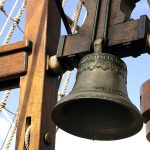 Many sailors believe that the ship’s bell is the most hallowed part of a ship. It represents the ship’s soul. There are many stories about the ship’s bell ringing after sinking while resting on the sea bed. The bell is often the most prized possession of a recovered ship.
Many sailors believe that the ship’s bell is the most hallowed part of a ship. It represents the ship’s soul. There are many stories about the ship’s bell ringing after sinking while resting on the sea bed. The bell is often the most prized possession of a recovered ship.
Bells are still used today in an official capacity under the Col Regs, signalling a ship’s position in foggy conditions.
Perhaps it is for these reasons that ringing any other bells is considered bad luck…
Grooming is bad luck
 Male sailors definitely developed this one over the years. Perhaps the phrase “Grotty Yachty” derives its origin from this superstition. In any case, any grooming was, and still is, considered bad luck. This includes:
Male sailors definitely developed this one over the years. Perhaps the phrase “Grotty Yachty” derives its origin from this superstition. In any case, any grooming was, and still is, considered bad luck. This includes:
- Cutting your hair – bad luck
- Shaving your beard – bad luck
- Trimming your nails – bad luck
All of these activities will give you and your crew bad luck…
If you are aware of any more superstitions related to sailing and the maritime industry, then why not leave a comment below…

Rule 14 – AVOIDING CONTACT
Rule 12 covers when boats are on the same tack and not overlapped. In that scenario, a boat clear astern must keep clear of a boat clear ahead.
Sailing Racing Rules – Conundrum 1
Sailing Racing Rules Conundrum 1 Rule 18.4 / Rule 10 Facts Two boats, Yellow and Blue, were sailing directly downwind towards a leeward mark to be left to port. They
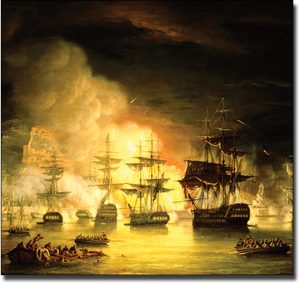
The Book of Maritime Idioms
The perfect gift for the sailor that has it all… Buy it on Amazon The Book of Maritime Idioms A curious collection of sailing terms that found new meaning in

Sailing and maritime superstitions
Sailing Superstitions As far as we can look back in history, sailing and maritime superstitions on boats and ships have always been prevalent. Why? Being a mariner was, and still

Creating Lateral Distance and Leverage
Creating lateral distance and leverage in competitive sailing Okay, so you need to know about lateral distance and how this relates to creating leverage. Well, here we go… First of

Correctly planning for Tides and Currents
Tides & Currents So you set a course to steer, follow it for a few hours and realise that you are not going to hit your waypoint or destination. You

Rule 10 – ON OPPOSITE TACKS
Rule 10 covers boats on opposite tacks. We look in detail into who should keep clear. Rule 10 is a fundamental rule. It is important to fully understand its application…

Rule 11 – ON THE SAME TACK, OVERLAPPED
Rule 11 covers when boats are on the same tack and overlapped. In that scenario, a windward boat must keep clear of a leeward boat.

Rule 12 – ON THE SAME TACK, NOT OVERLAPPED
Rule 12 covers when boats are on the same tack and not overlapped. In that scenario, a boat clear astern must keep clear of a boat clear ahead.

Rule 13 – WHILE TACKING
Rule 12 covers when boats are on the same tack and not overlapped. In that scenario, a boat clear astern must keep clear of a boat clear ahead.

Renaming your boat – the correct process
Renaming your boat Most maritime-related superstitious beliefs stem from Abrahamic monotheistic religions such as Christianity. But renaming your boat calls on the favours of the Greek god of water and
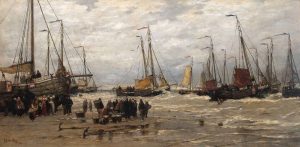
How to anchor your sailboat securely
How to Anchor Your Sailboat How to anchor your sailboat indeed… Easy, right? You have an anchor somewhere on the front of your boat and you drop it a good
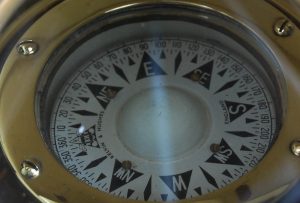
Why use nautical miles and knots in sailing
Why use nautical miles and knots in sailing? We use nautical miles and knots in sailing because a nautical mile is based on the circumference of the earth. One nautical

Rule 18.4 – Gybing
Rule 18.4 is all about the leeward mark and boats sailing their proper course. This means not sailing further from the mark than is required…

